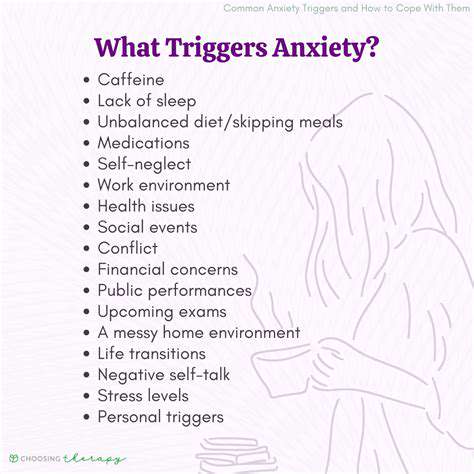Recognizing Sudden Anxiety Symptoms and Their Triggers

Unexpected Stressful Situations
Major life transitions, including career changes, interpersonal challenges, or health concerns, frequently precipitate acute anxiety episodes. The human psyche often struggles to process abrupt changes, resulting in physiological and psychological distress signals. This stress response typically manifests through both physical symptoms and emotional turbulence, creating a complex challenge for individuals.
Daily routine disruptions or unanticipated circumstances frequently exacerbate anxiety levels. Relocating residences, beginning new professional roles, or navigating family emergencies can destabilize the equilibrium people depend on for emotional security.
Physiological Health Factors
Various medical conditions such as endocrine disorders, cardiovascular issues, and pulmonary complications may present with anxiety-like symptoms. Comprehensive medical assessment remains essential to differentiate between organic conditions and primary anxiety disorders. Frequently, underlying health issues mimic anxiety symptoms, potentially delaying appropriate treatment and allowing conditions to progress.
Pharmaceutical interventions, including both prescribed medications and OTC products, can influence neurotransmitter balance and contribute to anxiety symptoms in susceptible individuals. Careful review of medication profiles proves crucial for comprehensive anxiety management.
Daily Habit Influences
Irregular sleep patterns, sedentary behavior, and nutritional imbalances profoundly affect emotional regulation capacity. Consistent implementation of health-promoting behaviors helps modulate the body's natural stress adaptation systems. Regular physical activity, balanced macronutrient intake, and adequate restorative sleep form the foundation for emotional stability. Addressing deficiencies in these areas significantly reduces vulnerability to anxiety episodes.
Chemical Substance Effects
Psychoactive substances including stimulants, depressants, and recreational drugs temporarily alter anxiety thresholds. Prolonged substance misuse can establish persistent anxiety patterns that endure beyond active use periods. Additionally, withdrawal syndromes frequently produce severe anxiety symptoms as neurochemistry rebalances following substance cessation.
Psychological Trauma Impact
Historical traumatic experiences such as interpersonal violence, catastrophic events, or natural disasters create lasting psychological imprints. These memories can trigger disproportionate anxiety responses years after the original event. Trauma-related anxiety often presents through intrusive recollections, nocturnal disturbances, and exaggerated threat responses. Professional therapeutic intervention proves essential for processing traumatic material and developing adaptive coping strategies.
Cognitive Pattern Contributions
Maladaptive thought processes including catastrophic predictions, unrealistic standards, and repetitive negative thinking substantially amplify anxiety experiences. Systematic identification and modification of these cognitive distortions represents a cornerstone of effective anxiety management. Cognitive restructuring techniques, particularly those employed in cognitive behavioral therapy, help individuals develop more balanced thought patterns and functional coping methods.
Effective Strategies for Anxiety Trigger Management
Recognizing Personal Anxiety Catalysts
Conscious awareness of specific circumstances, cognitive patterns, or emotional states that reliably precede anxiety episodes forms the foundation of effective intervention. This process requires deliberate self-observation and honest reflection. Maintaining a detailed anxiety journal that records emotional states, situational contexts, and somatic responses helps identify recurring patterns and potential triggers. For instance, one might discover that performance evaluations consistently provoke anxiety symptoms, or that particular social dynamics trigger feelings of inadequacy.
Recognize that triggers often operate subtly and may involve multiple interacting factors. Environmental cues, interpersonal dynamics, or even specific thought sequences can serve as catalysts. Comprehensive examination of these elements provides critical insights into individual anxiety responses.
Developing Targeted Coping Strategies
Following trigger identification, the next phase involves creating customized response plans. This may incorporate relaxation methods such as controlled breathing techniques or systematic muscle relaxation. These approaches help regulate autonomic nervous system activity and mitigate physiological anxiety manifestations. Present-moment awareness practices also demonstrate significant efficacy in managing trigger responses.
Cognitive restructuring methods help challenge and modify maladaptive thought patterns. When facing situations that typically provoke self-doubt, systematically examining and reframing automatic thoughts can substantially reduce anxiety intensity.
Establishing Personalized Relaxation Practices
Implementing consistent relaxation rituals creates psychological resilience against anxiety triggers. These routines should include activities that promote parasympathetic nervous system activation. Options include hydrotherapy, ambient sound therapy, moderate physical movement, or natural environment immersion. Regular practice strengthens the body's stress response capacity.
Incorporating mindfulness meditation into daily routines enhances emotional regulation. This practice cultivates nonjudgmental awareness of present-moment experiences, creating psychological distance from anxious thoughts.
Applying Present-Centered Techniques
Mindfulness-based strategies, particularly breath awareness and body scanning, effectively manage externally triggered anxiety. Training attention to remain present reduces habitual engagement with anxious thought patterns. These methods also promote grounding in immediate reality, preventing anxiety escalation.
Sensory grounding techniques, such as systematic engagement with environmental stimuli, provide effective anxiety interruption. Consciously noting visual, auditory, olfactory, gustatory, and tactile sensations helps reorient attention to the present.
Accessing Support Networks
Effective anxiety management often benefits from social support systems. Confidential discussions with trusted individuals or professional counselors provide emotional validation and practical coping strategies. Sharing anxiety experiences with understanding listeners reduces subjective distress and offers alternative perspectives.
Professional psychological support delivers personalized intervention strategies for addressing underlying anxiety mechanisms. Therapeutic relationships facilitate pattern recognition, skill development, and tailored anxiety management approaches.
Implementing Lifestyle Modifications
Adopting health-promoting behaviors significantly impacts anxiety trigger responses. Prioritizing sleep hygiene, nutritional balance, and consistent physical activity enhances emotional regulation capacity. Regular exercise stimulates endorphin release, producing natural mood stabilization effects.
Reducing stimulant consumption and moderating alcohol intake helps prevent anxiety symptom exacerbation. Conscious lifestyle choices substantially decrease anxiety trigger vulnerability.
Professional Intervention for Chronic Anxiety

Addressing Persistent Anxiety Patterns
Chronic anxiety significantly impacts multiple life domains, including interpersonal relationships, occupational functioning, and overall quality of life. Recognizing the need for professional support represents psychological strength rather than weakness. Early intervention prevents symptom escalation and facilitates more effective management strategies. Proactive anxiety treatment supports long-term emotional well-being.
Many individuals experience difficulty implementing effective anxiety management techniques independently. Professional guidance creates a structured environment for exploring anxiety origins and developing personalized coping frameworks.
Analyzing Anxiety Origins
Comprehensive anxiety management requires thorough understanding of contributing factors. This involves careful self-examination across multiple life domains. Accurate identification of anxiety sources enables targeted intervention strategies.
Following source identification, individuals can implement specific countermeasures. These may include workplace boundary establishment, relationship communication enhancement, or health behavior modification. While challenging, this analytical process proves essential for sustainable anxiety reduction.
Building Adaptive Coping Skills
Developing functional anxiety management techniques represents a critical treatment component. Strategies including diaphragmatic breathing, mindfulness meditation, and systematic relaxation provide immediate symptom relief. Regular practice builds neurological resilience against anxiety triggers.
Engagement in meaningful activities such as creative pursuits, nature immersion, or skill development provides additional anxiety management benefits. These activities foster positive emotional states and distraction from anxious thoughts.
Therapeutic Approaches to Anxiety
Professional therapy offers structured anxiety intervention through evidence-based modalities. Trained clinicians help identify maladaptive patterns and teach effective management techniques. This individualized approach produces significant improvements in anxiety symptom severity and frequency.
Understanding Physiological Responses
Comprehending individual stress physiology enhances anxiety management effectiveness. Recognizing personal symptom patterns enables customized intervention development.
Identifying specific anxiety triggers allows for proactive coping strategy implementation. These triggers may involve particular situations, interpersonal dynamics, or internal thought processes.
Utilizing Social Support Systems
Social connection serves as a powerful anxiety management resource. Sharing experiences with empathetic listeners reduces isolation and provides emotional validation.
Actively engaging support networks during challenging periods offers both practical assistance and psychological comfort. These relationships form a critical component of comprehensive anxiety management.
Selecting Appropriate Professional Support
Choosing suitable therapeutic professionals requires careful consideration. Evaluate practitioner qualifications, therapeutic orientation, and interpersonal style when making selection decisions. Therapeutic alliance quality significantly impacts treatment outcomes.
Professional anxiety treatment represents a proactive step toward improved mental health. Appropriate intervention facilitates sustainable anxiety management and enhanced life quality.